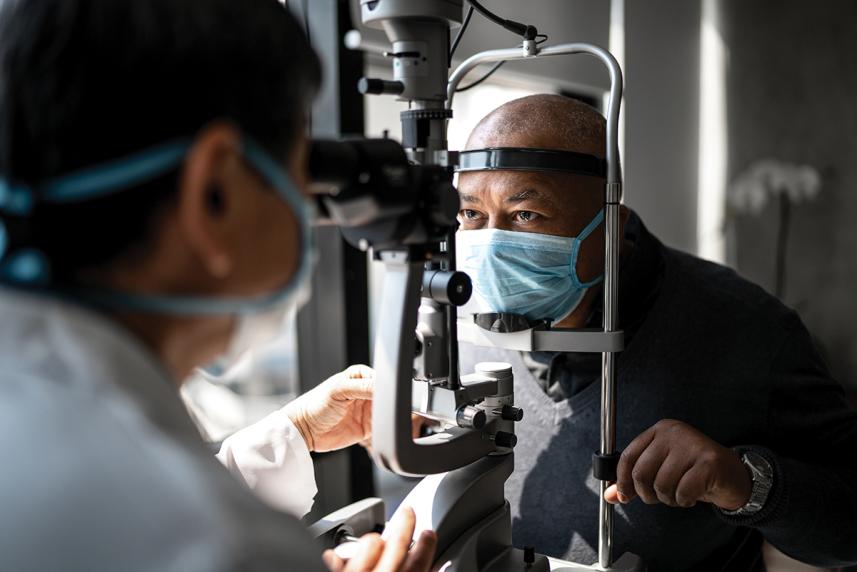6 surprising things your eyes reveal about your health
Your eye doctor can spot signs of new or worsening health conditions before you notice symptoms

If you don’t need glasses or contacts to see clearly, then you might think a trip to the eye doctor isn’t worth your time. But getting your eyes checked can tell you a lot more about your health than you think.
“It has to do with location, location, location,” says Andrew Iwach, MD. He’s a clinical spokesperson for the American Academy of Ophthalmology. “Where the eyes are located, and where the pathways are in the brain, give us insight into what’s happening in the body. The eyes are the only part of the body where we can see bare arteries, veins and nerves without making an incision.”
An eye exam can find a serious illness before symptoms start. Or it can be a sign that a disease you have is getting worse and needs more care.
Here are some of the health problems your eye doctor can help spot that might surprise you. Here’s what to know.
1. High blood pressure
During an eye exam, your doctor may use eyedrops to help widen your pupil. This gives them a better view of the back of your eye. If they see changes such as a different appearance or slight bleeding, that may mean you have high blood pressure, Dr. Iwach says.*
Need to find an in-network eye doctor?
Visit AetnaMedicare.com/FindProvider or call Member Services at 1-866-409-1221 (TTY: 711) between 8 AM and 8 PM, 7 days a week.
2. Diabetes
Diabetes affects the retina. That’s the part of the eye that takes in light so you can see. If you have diabetes, an eye doctor may notice the blood vessels in your eyes are leaking into the retina.
At first, this illness may cause no symptoms at all. Or it may cause a little blurriness. It can also lead to blindness over time. Treating your diabetes, and your eyes, can help save your vision.
3. High cholesterol
The clear layer that covers your eye (called the cornea) may have cholesterol deposits, which may be flat or raised. These aren’t usually anything to worry about. And there’s usually no need for treatment. * But cholesterol deposits on your eyes can be a sign that you need to visit your primary care provider (PCP) to talk about your cholesterol levels and heart health.
4. Chronic conditions
Some illnesses can cause inflammation in the body. That includes many parts of your eye. This may let your eye doctor know that you should visit a provider who focuses on chronic illnesses.
Examples of chronic conditions are rheumatoid arthritis, Type 1 diabetes and multiple sclerosis. Rheumatoid arthritis may hurt your joints like those in the hands and feet. Multiple sclerosis is a disease where the immune system affects the covers that protect your nerves. And Type 1 diabetes stops your pancreas from making insulin. Your body needs insulin to manage blood sugar.
Have a health question that can’t wait for your next checkup?
Call the 24-Hour Nurse Line at 1-866-409-1221 (TTY: 711) to speak with a registered nurse. If you need urgent or emergency care, call 911 or go to your closest emergency room.
5. Certain cancers
Some cancers can spread to the eye. These are cancers that grow throughout the body, Dr. Iwach says. Some can change your eye structures. Also, “Skin cancer can show up near the eyes because they get a lot of UV radiation.” These are all things your provider will look for in an eye exam.
6. Aneurysm (AN-yoo-riz-um)
“If the pupils are not working right, that could be a sign of an aneurysm,” Dr. Iwach says. An aneurysm (AN-yoo-riz-um) is a weak spot in the wall of an artery. It looks like a little balloon. It can press on nearby tissue and nerves, causing one of your pupils to be larger. Other signs include a drooping eyelid, eye pain above or behind the eye or double vision.
If your eye doctor sees any of these changes, they may suggest seeing a specialist like a brain doctor, Dr. Iwach says. If you notice any of these signs, call your provider right away. It could mean you have an aneurysm or other serious condition that could be deadly.*
When you take charge of your eye health, you can take charge of your health overall. So go ahead and schedule your eye exam today.
*FOR HIGH BLOOD PRESSURE AND PARTS OF THE EYE SOURCE: Mukamal R. American Academy of Ophthalmology. 20 surprising health problems an eye exam can catch. April 29, 2022. Accessed May 14, 2024.
*FOR RETINOPATHY SOURCE: Cleveland Clinic. Your eyes: a window to your health. July 5, 2020. Accessed May 14, 2024.
*FOR LIGHT IN THE EYE SOURCE: Mayo Clinic. Diabetic retinopathy. February 21, 2023. Accessed May 14, 2024.
*FOR CHOLESTEROL TREATMENT SOURCE: Lopez-Jimenez F. Mayo Clinic. Arcus senilis: a sign of cholesterol? July 8, 2023. Accessed May 14, 2024.
*FOR BRAIN ANEURSYM DANGER SOURCE: Mayo Clinic. Brain aneurysm. March 7, 2023. Accessed May 14, 2024.
See Evidence of Coverage for a complete description of plan benefits, exclusions, limitations and conditions of coverage. Plan features and availability may vary by service area. This material is for informational purposes only and is not medical advice. Health information programs provide general health information and are not a substitute for diagnosis or treatment by a physician or other health care professional. Contact a health care professional with any questions or concerns about specific health care needs. Providers are independent contractors and are not agents of Aetna. Provider participation may change without notice. Aetna is not a provider of health care services and, therefore, cannot guarantee any results or outcomes. The availability of any particular provider cannot be guaranteed and is subject to change. Information is believed to be accurate as of the production date; however, it is subject to change. For more information about Aetna plans, refer to our website. Participating health care providers are independent contractors and are neither agents nor employees of Aetna. The availability of any particular provider cannot be guaranteed, and provider network composition is subject to change. If your plan’s Extra Benefits Card includes roll-over, any unused amount will rollover into the next month. The monthly amount can be rolled over through the end of the plan year but will not carry over into the next plan year.
Non-Discrimination Notice | CA-Specific Non-Discrimination Notice
©2025 Aetna Inc.
Y0001_3464716_2024_C
3704358-03-01



